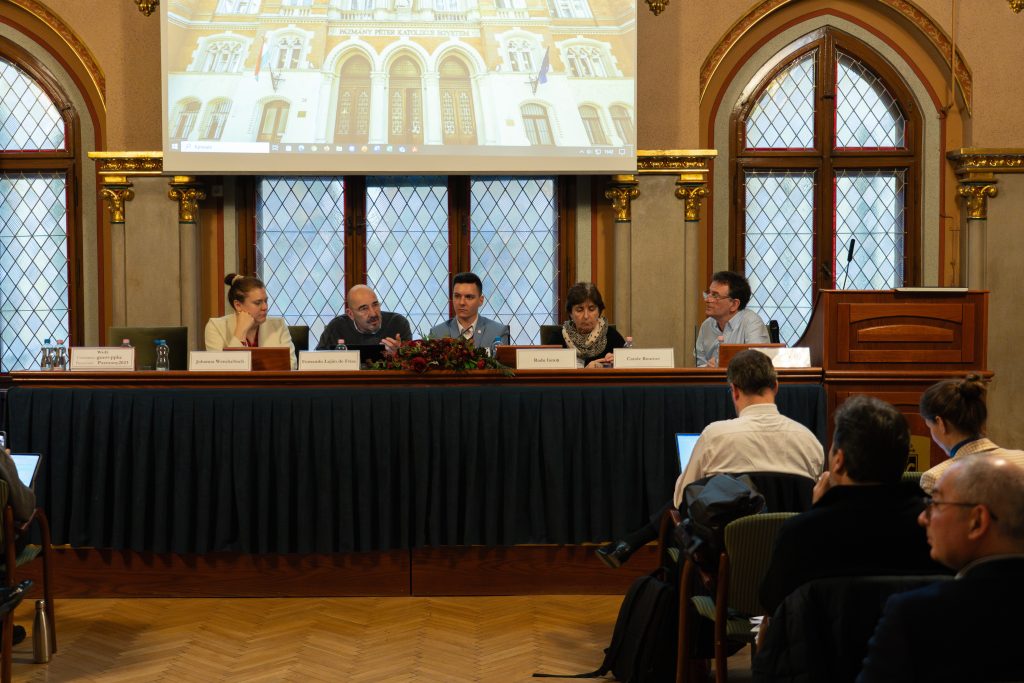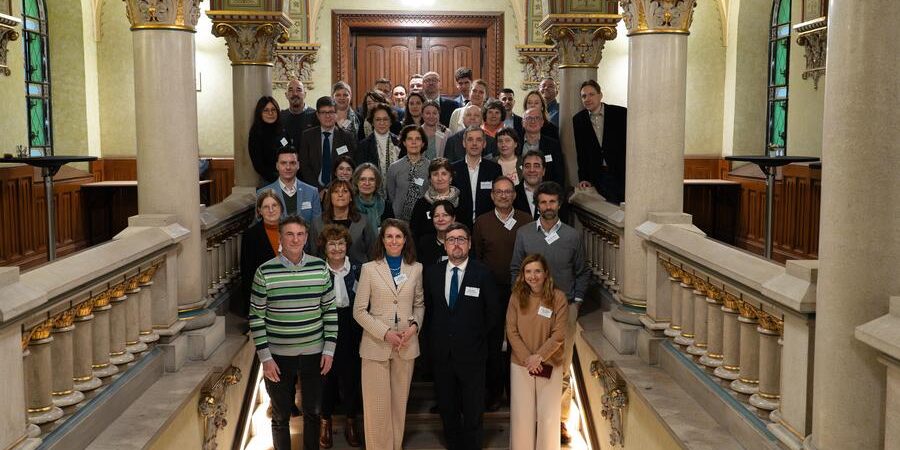Second transnational seminar of the DIGILARE projcct in Budapest
The second transnational seminar of the project took place on 27-28 February, according to the schedule approved by the European Commission. It took place at the Pétér Pázmány Catholic University in Budapest, where Tamás Gyulavári and Gábor Kártyás, members of the research team, were responsible for organising the seminar.

After a general presentation of the project, Elisabeth Brameshuber, co-manager of the project, presented the results of the first part of the research in the form of the first synthesis report on WHO and WHERE coordinates. The report is available at: https://www.digilare.eu/documentation/first-synthesis-report-digilare/

Judith Brockmann and Nicola Gundt, under the chairmanship of Kübra Dogan Yenisey, then presented their synthesis of the HOW coordinate, focusing on digital modes of information and consultation available to workers’ and employers’ representatives. This was followed by a rich discussion with the audience, mostly social partners, who provided useful feedback for the development of the research.

In the afternoon session, a round table chaired by Tamás Gyulávári was held, in which various stakeholders took part, contributing to the exchange of good practices and the co-creation of knowledge, in accordance with the objectives of the project. Carole Bourner, Responsible for International – Fédération CFDT FBA, former secretary of the Generali EWC, France; Radu Ianoș, Pubblic Affairs Specialist, Confederatia Patronala Concordia, Romania; Fernando Luján de Frías, Deputy Secretary General for Trade Union Policy, UGT, Spain; and Johanna Wenckebach, Head of the legal department, IG Metall Bundesvorstand, Germany participated in this activity. Numerous participants took part in the subsequent debate.
The morning of the second day was devoted to the WHAT coordinate, in which the digital content of collective bargaining and information and consultation within the company was analysed. Chaired by Luca Ratti, Daniel Pérez del Prado, Teresa Coelho Moreira and Yolanda Maneiro Vázquez presented their synthesis of the questionnaires prepared by the project members, addressing in particular the digital means of surveillance, algorithms, environmental issues and the right to disconnect. The stakeholders present provided very important feedback.
The morning was closed with a new round table with stakeholders, chaired by Felicia Rosioru. Speakers were Odile Chagny, economist and researcher, IRES, France; Cristina Faciaben Lacorte, Confederal Secretary for International, Cooperation and Migration, CCOO, Spain; Karoline Kettenberger, lawyer; Robert Lisicki, Director of Labour Department, Konfederacja Lewiatan, Poland; and Maximilian Messinger, Department for Social Policy, Wirtschaftskammer Niederösterreich, Austria.
The afternoon session started with a new round table discussion, chaired by Gábor Kártyás, on theoretical challenges and critical points of the subject matter. Team members Jenny Julen Votinius and Łukasz Pisarczyk, as well as Maxime Legrand, President of CEC European Managers, participated in the round table, which was again open to the public, who were also involved in a digital voting system after the discussion of each round table item.
The seminar concluded with the presentation by José María Miranda Boto of the future developments of the project, which will be finalised at the final conference in Santiago de Compostela on 11-12 September 2025.
The list of organisations attending the Seminar included the trade unions IG Metall Bundesvorstand, (Germany), Comisiones Obreras (Spain), Unión General de Trabajadores (Spain), Fédération CFDT FBA (France), Solidarność (Poland), União Geral de Trabalhadores (Portugal), Cartel ALFA (Romania) and the Journalists’ Union (Türkiye), as well as the transnational CEC European Managers. Members of the employers’ organisations Wirtschaftskammer Wien (Austria), Wirtschaftskammer Niederösterreich (Austria), Confindustria (Italy), Konfederacja Lewiatan (Poland), Confederação do Turismo (Portugal) and Confederatia Patronala Concordia (Romania) participated. There were also attendees from the French Cour de Cassation, and IRES (France).

